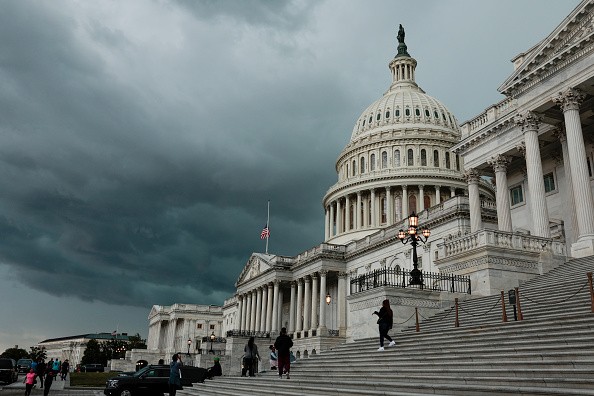The US Senate has resumed the Ukraine aid negotiations on Capitol Hill on Monday to secure the southern border, even with House lawmakers out of town.
The lawmakers identified several hurdles to overcome before they could reach an agreement.
US Senate Resume Ukraine Aid Negotiations

Republicans and Democrats in the upper chamber have been working on a deal strengthening US policy at the southern border in exchange for additional aid to foreign allies like Ukraine and Israel.
Sens. James Lankford (R-Okla.), Kyrsten Sinema (I-Ariz.), Chris Murphy (D-Conn.), and both Senate party leaders were the assigned negotiators on the deal. The negotiations have recently included Alejandro Mayorkas, the Department of Homeland Security Secretary, and the White House representatives.
The resumption of negotiations was followed by a poll showing dwindling support for President Biden's handling of the border. Fox News poll showed 66% of Americans disapprove of the resumption.
Biden's administration has resulted in over 6 million illegal aliens entering the country via the southern border, overburdening the resources of towns lying along the thousands of miles of border. Negotiators in the Senate have been unresponsive on the details of the negotiations, but a few broad themes have emerged.
The negotiators were reportedly considering raising the standard of credible fear to seek asylum, which would significantly reduce asylum claims and expand detentions and deportations. The standard potentially includes the adoption of a Title 42-like policy that would give Border Patrol agents greater caution in turning away illegal aliens at the border.
Senate Republicans claimed these concessions were the bare minimum, while House Republicans aimed for a more comprehensive reform like the House-passed H.R. 2 immigration bill.
Lawmakers were now resuming talks after Senate Majority Leader Chuck Schumer (D-N.Y.) decided to postpone the holiday recess, initially set to begin December 14, to buy more time to reach a deal.
On Sunday, Sens. John Cornyn (R-Texas) and Chris Van Hollen (D-Md.) had the same ambiguous sentiment, saying that negotiators were progressing.
However, some lawmakers, including Sen. Lindsey Graham (R-S.C.), doubt whether a deal can be achieved by New Year's Day amid the dispute between the two major parties and both chambers of Congress and party.
Graham was asked about the prospects of reaching a deal before 2024 during the 'Meet the Press.' He said, "We're not anywhere close to a deal. It'll go into next year."
He added that getting a good border deal was important and that Republicans would not give in on some Band-Aid fix. Many observers agreed with Graham's evaluation that any quick deal was a long shot, mainly because the House had already left Washington for its holiday recess.
Read Also : Denmark Intensifies Terror Investigation After Hamas Suspects Arrested for Planning Attacks
Republicans Block Ukraine Aid
On Monday, Republicans voted against advancing a more than $100 billion supplemental national security package. They said they would only support the funding if it included significant border policy changes.
West Virginia GOP Sen. Shelley Moore Capito, a member of the Senate Appropriations Committee, said that she opposed moving forward on cloture. She explained that she was not against a national security supplemental, but it must include their national security at the border.
Sen. James Lankford of Oklahoma also predicted that such a vote would fail. He said that he did not want to have a failed vote on anything.
Majority Leader Chuck Schumer would need nine Republicans to overcome a procedural hurdle. However, many Republicans signaled on Monday not to help Democrats.
© 2026 HNGN, All rights reserved. Do not reproduce without permission.








